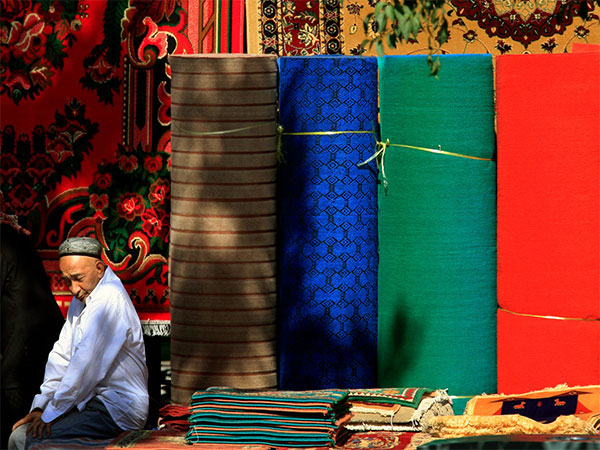Uyghur asylum seekers keep dying in Thailand's detention centres
Mattohti is the fifth Uyghur asylum seeker to die in Thai detention over the past nine years. In 2018, a 27-year-old man died of cancer at a Thai immigration detention facility after being detained there for four years. Another two Uyghur children died in 2014, according to media reports, including a three-year-old boy suffering from tuberculosis.

- Country:
- Thailand
An Uyghur refugee, who was detained by Thai authorities in 2014 while fleeing persecution in China, died last week after spending nine years in detention, Uyghur rights groups say, the Vice reported. The refugee, 40-year-old Mattohti Mattursun, died last Friday after being taken to the hospital due to liver and respiratory problems, according to a statement by the World Uyghur Congress and the Uyghur Human Rights Project.
The groups are demanding that the Thai government investigate the living conditions of Uyghur asylum seekers held in the Suan Phlu immigration detention centre in Bangkok. His death comes just two months after the death of 49-year-old Aziz Abdullah, another Uyghur asylum seeker who died from reported pneumonia in the same detention centre. Both men were transferred to the centre in July last year, the rights groups said in the statement, the Vice reported.
Mattohti is the fifth Uyghur asylum seeker to die in Thai detention over the past nine years. In 2018, a 27-year-old man died of cancer at a Thai immigration detention facility after being detained there for four years. Another two Uyghur children died in 2014, according to media reports, including a three-year-old boy suffering from tuberculosis. "This tragic death of yet another Uyghur being held in indefinite immigration detention in Bangkok shows the danger of the cramped and outrageously unhygienic conditions these men have faced for almost ten years," Phil Robertson, Human Rights Watch's Asia deputy director, told VICE World News.
"Thailand's desire for this 'problematic' group of Uyghur detainees to go away apparently also includes letting them get sick and die. This wholly negligent, completely inhumane treatment denies them even basic health care," Robertson said. The Chinese government has drastically tightened its control over the country's Uyghur population since 2014 after Uyghur militants killed 31 in a mass stabbing attack at a train station in southwestern China, the Vice reported.
Vowing to fight terrorism, Beijing has turned the far-western Chinese region of Xinjiang, where most Uyghurs live, into what rights groups have described as a "dystopian hellscape" and severely curtailed the ethnic and religious identity of Uyghurs, a mostly Muslim Turkic ethnic group. As many as a million Uyghurs, Kazakhs and other Muslims in China have been detained in internment camps since 2017, in a series of abuses that the United Nations said could amount to crimes against humanity.
Thailand is not a signatory to the 1951 Refugee Convention and does not have specific asylum legislation. Consequently, refugees and asylum seekers, including those fleeing persecution in Xinjiang, are routinely arrested and treated as criminals. At least 350 Uyghur men, women, and children fleeing China have been arrested upon entering Thailand since 2013. In 2015, 172 of the women and children were resettled in Turkey. But a few weeks later, Thai authorities deported 109 of the group back to China.
At the time, international rights groups and the United Nations expressed fear that they would be imprisoned or tortured upon their return. Meanwhile, 20 detainees broke out of a detention centre in 2017 by using blankets to scale the wall, the Vice reported. Amir, a pseudonym used to protect him from reprisals, spent two years inside Bangkok's Suan Phlu immigration detention centre, living side-by-side with a group of Uyghurs in 2020. As a refugee himself who is now safely outside the facility, he claims the Uyghur community was treated far worse than all of the other detainees inside for "political reasons".
"They were pretty much treated like terrorists," Amir told VICE World News, adding, "They were not allowed visits, could not receive money, and were not allowed to use mobile phones. Their leaders were punished if immigration authorities found out if they were using a mobile phone." He added that immigration officials would routinely ransack their living space and go through their belongings looking for contraband.
The two Uyghur rights groups are now calling on the Thai government to release detained Uyghurs immediately and provide them with resettlement choices. John Quinley III, director of Fortify Rights, an international human rights watchdog, calls for an "urgent independent investigation" into the deaths at Thailand's immigration detention centres, which also hold North Korean defectors and Rohingyas from Myanmar, the Vice reported.
"The Government of Thailand should end the indefinite detention of refugees and migrants," he told VICE World News, adding that the government should collaborate with civil society organisations and human rights groups to find alternatives to detention. In 2017, a Rohingya girl died in an immigration detention centre in southern Thailand. Rights groups said she "died from bleeding in her brain and an alleged blood-clotting disorder." Her death sparked concern among the refugee rights community about the conditions inside Thailand's detention centres.
For years, detainees have also said that they face torture and ill-treatment while inside Thailand's detention centres. Although the government denies that detainees are abused, the evidence of mistreatment inside continues to mount. (ANI)
(This story has not been edited by Devdiscourse staff and is auto-generated from a syndicated feed.)










